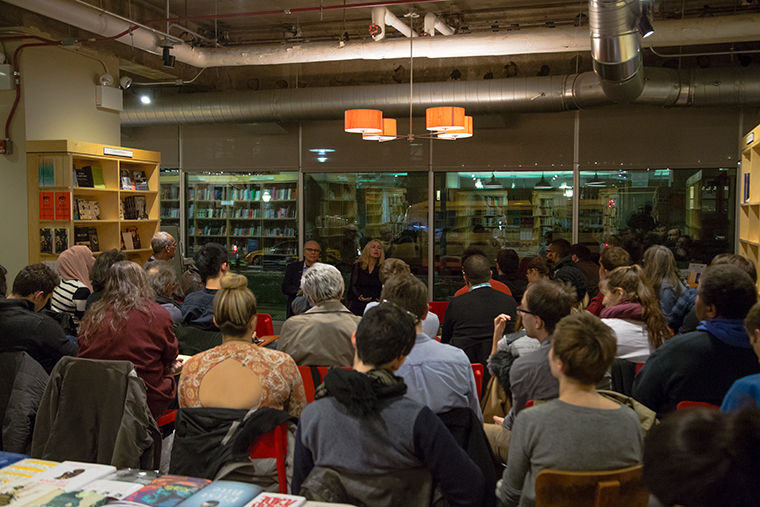Symposium seeks educated answers for complex issues
Lisa Wedeen, a University of Chicago professor of political science, led a lively conversation on Nov. 19 about the proxy war in Syria.
November 30, 2015
Seminary Co-op Bookstore, 5751 S. Woodlawn Ave., is in the middle of its “Literary Public Sphere: Conversations at the Co-op” series, which invites experts on issues like racial tension in the U.S. and the worldwide refugee crisis to openly discuss their specialties with an audience, facilitating an educated dialogue about these issues.
Seminary Co-op Director Jeff Deutsch said most bookstores do traditional readings—authors talking about books they have written—but there has been a push for more conversations based around topics rather than books.
“We received a number of requests for [this type of series] and decided we finally had the infrastructure to put it together,” Deutsch said.
Each event is hosted by Isaac Balbus, professor emeritus of Political Science at the University of Illinois at Chicago, who Deutsch said helped him find qualified people to lead the dialogues, which include professors from Northwestern University, University of Chicago and UIC.
Deutsch said the first of these events, held Oct. 29, covered “Bernie Sanders and Black Lives Matter: Class and Race in America” and was a success.
He added that there is a lack of in-depth conversations about these issues in today’s landscape.
“Something like this can bring people of differing perspectives into a forum where it isn’t about clickbait or valueless [information],” Deutsch said. “It’s about going a little deeper and having something a little more meaningful than what we find when we get our news online or on talk shows.”
At a Nov. 19 event about the Syrian crisis, Balbus echoed Deutsch’s feelings about the series, noting it seeks to jump start a very specific type of conversation.
“One of our principle goals is to reclaim conversation from screens and tweets,” Balbus said. “We’re also interested in a conversation informed by the work of a scholar.”
Balbus added not everyone in the audience may be an academic, but part of his goal was to “strike [a] balance” between inclusion of differing opinions and cohesion about the topic.
The introductory scholar for this event was Lisa Wedeen, a political science professor at U of C.
In her introduction, Wedeen asked, “How did a civilian uprising in Syria become militarized, eventually leading to sectarian proxy war of nightmarish proportions?” This became the central discussion question, from which attendees could pose possible solutions and state opinions.
When an attendee asked whether there was hope for a “rational, thoughtful plan” for the Syrian violence and proxy war, Wedeen reiterated the importance of civilian intelligence and education on the topics being discussed in the series and hope that these types of events will contribute to that end.
“This effort at a ‘literary public sphere’ is important,” Wedeen said. “Let’s put our heads together and come up with a language and a way of organizing politically.”
Wedeen added that some of the goals established in these dialogues may be lofty, but they are a positive step toward figuring out how to deal with crises in an educated and sophisticated way.
“What I want to do is be able to think with you guys here about things that may sound unrealistic …but can push the parameters of the possible for the future,” Wedeen said.








